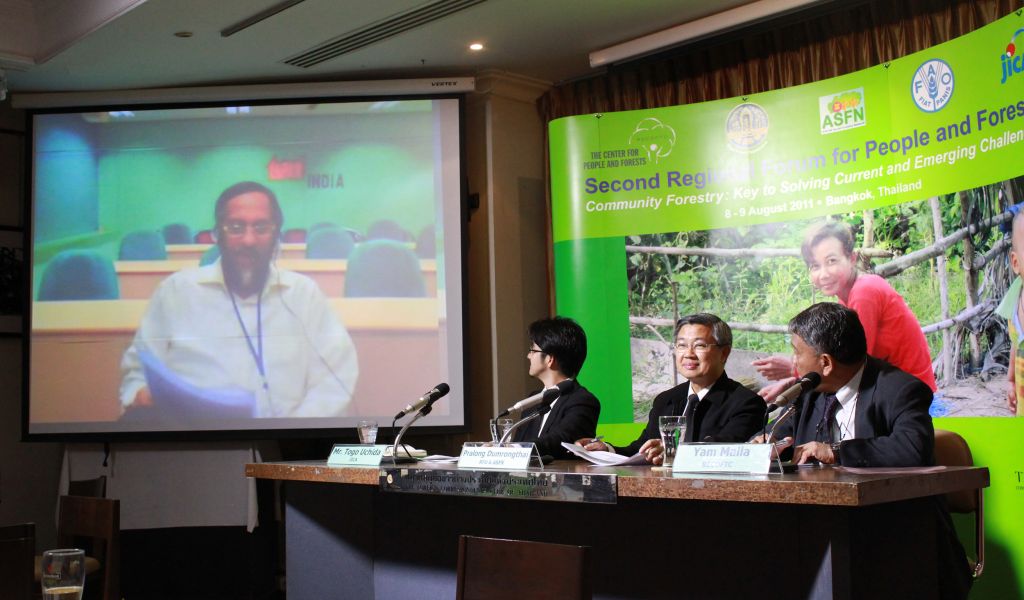Curbing deforestation requires economic incentives, government cooperation with local people

On Friday, August 5, RECOFTC – The Center for People and Forests had the pleasure of hosting Dr. R. K. Pachauri, Nobel laureate and head of the Intergovernmental Panel on Climate Change (IPPC), as one of the speakers at a press conference in advance of the Second Regional Forum on Community Forestry in Bangkok. The Conference was attended by 35 media and civil society representatives at the Foreign Correspondents Club of Bangkok. Dr. Pachauri has made tremendous contributions to climate change research and advocacy throughout his career, and RECOFTC was honored to have him speak on his perspectives on climate change and community forestry.

Deforestation is a major problem in the Asia Pacific region, with ramifications echoing throughout the ecosystem. “When you affect forest covers, there is an entire chain of ecosystems that suffers,” Dr. Pachauri noted, recalling his childhood in the forested mountains of India. Those forests, along with many in the region, have seen dramatic reductions in forestland and forest density, affecting biodiversity and water supply both locally and regionally. Indeed, although forest cover has increased by approximately 0.20 percent annually since 2005, forest density has decreased throughout the region, and much of the growth in forest cover comes from new planting in countries like China and India. New forests do not absorb as much carbon as do old growth forests, making preserving existing forestlands even more important. Watch an excerpt on the subject from Dr. Pachauri's talk:
The challenge of deforestation requires the development of mechanisms for measuring the economic value of ecosystem services to help determine the economic cost of deforestation and ecosystem degradation, Dr. Pachauri said. While forests sustain the livelihoods of some of the world’s poorest and most vulnerable populations, the inability to accurately measure ecosystem services in financial terms inhibits regulation and taxation. Dr. Pachauri highlighted the Joint Forest Management Program in India, a new initiative that assigns specific value and benefit to ecosystem services. The program facilitates local communities working with the government to reap the full benefits of their forests, creating two sets of stakeholders with an interest in maintaining forest cover in India.
Another promising mechanism for simultaneously supporting conservation and livelihood generation is REDD+ ("Reducing Emissions from Deforestation and Forest Degradation (REDD) is an effort to create a financial value for the carbon stored in forests, offering incentives for developing countries to reduce emissions from forested lands and invest in low-carbon paths to sustainable development" -- UN). As a climate scientist, Dr. Pachauri has faith that the REDD+ mechanism will help curb deforestation and provide important benefits to local people, but he acknowledged the complexities inherent in the system and emphasized the need for REDD+ implementation with due safeguards to ensure communities also benefit. Watch an excerpt on this subject from Dr. Pachauri's talk:
Dr. Pachauri was joined on the panel by Dr. Yam Malla, Executive Director of RECOFTC; Mr. Pralong Dumrongthai, Director of the Bureau of Community Forest Management, Royal Forest Department of Thailand; and Mr. Togo Uchida from the Japan International Cooperation Agency (JICA) Thailand.
Related article:
Reuters AlertNet, 6 August 2011, “Value on ecosystem services needed to curb Asian deforestation – IPCC chief”
Information on the Joint Forest Management Program:
"Lessons from Joint Forest Management Program," TERI, 2002
"Joint forest management in India and the impact of state control over non-wood forest products," UN FAO

